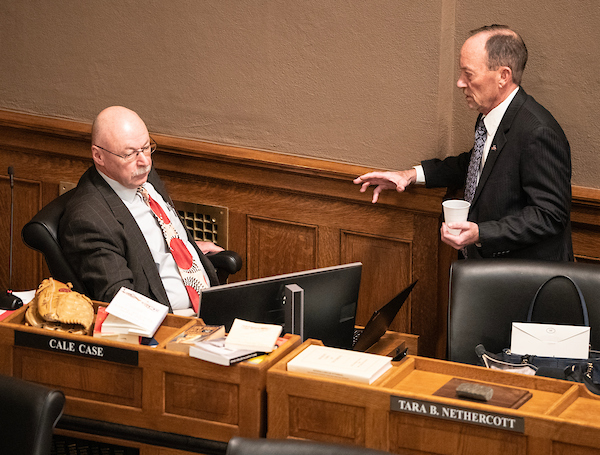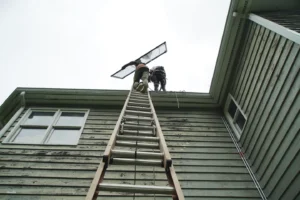Lawmakers Oppose Rocky Mountain Power Rate Increases
Corporations committee spends day discussing electric rates, corresponding legislation
- Published In: Politics
- Last Updated: Sep 21, 2023

Senator Cale Case (R-Lander) talks with Bill Landen (R-Casper) before a morning session during the 2023 Legislative session in the Senate Chambers in the Capitol. Both Case and Landen sit on the Corporations Committee, which discussed the Rocky Mountain Power rate case on Wednesday. (Photo by Michael Smith)

By Carrie Haderlie
Special to the Wyoming Truth
Lawmakers took a public stand against a proposed electricity rate increase of up to 30%, sought by one of the state’s largest utilities, in a unanimous committee vote Wednesday.
The Joint Corporations, Elections and Political Subdivisions Committee discussed electricity rates nearly all day, hearing from the public, lobbyists and representatives from several utilities in Wyoming at a meeting in Cheyenne.
Wyomingites have voiced vigorous opposition to the requested Rocky Mountain Power rate increase, which would mean an average residential customer using 660 kilowatt-hours per month would see their monthly bill rise by approximately $3.52. The new rates also would affect industrial users, such as those in the energy sector and small business owners, experts said.
Ultimately, the 14-member committee approved a resolution opposing Rocky Mountain Power’s proposed electric rate hikes, which broadly states that “Rocky Mountain Power’s proposed rate increase as detrimental to the well-being of our constituents and contrary to the public interest.” Read the full resolution here.
“There are quite a few ‘whereas’ clauses, perhaps far too many. But I will support it based off of the … end opposing the rate increase,” Sen. Brian Boner (R-Douglas) said. “We can disagree about all the things that led to the proposed rate increase, but for now, I think I am going to focus on the” oppositional message regarding the increase.
Following the resolution, Committee Co-Chairmen Rep. Jared Olsen (R-Cheyenne) and Sen. Cale Case (R-Lander) will send a letter to the Wyoming Public Service Commission formally stating the committee’s opposition.
Sen. Charles Scott (R-Casper) said that unless the committee sponsors further legislation as discussed Wednesday, the resolution will be meaningless.
“If we adopt this, we are committing ourselves to adopting some real legislation at the next meeting,” he said. “Otherwise I think we will rightly be criticized for wasting our time on frivolous resolutions when we could have been passing bills.”
“We’ve got six bills” to consider, Olsen replied.
The committee will meet again on Oct. 26 and 27 in Cheyenne. Members discussed extending that meeting if necessary to review the raft of utilities-related legislation, along with other elections-related legislation, under consideration.
Formula for regulating rates and company stance
Early in the meeting, Case explained that regulated utilities in the United States are governed by public service commission and granted the right to serve an often exclusive area at a regulated rate. There is a formula by which those rates are determined, Case said, which does allow a company to earn a return on its investment.
“That is pretty well established,” Case said. “You cannot say they don’t get that opportunity to earn a return. You will lose in court. It is a constitutional violation.”
But Sen. Bill Landen (R-Casper) pointed out that many misunderstand the process by which utility rates are set.
“One of the [misconceptions] I’ve run into, and that people don’t understand, is that a company like Rocky Mountain Power is not going to get anything they ask for, just carte blanche,” Landen said. “It is regulated.”
President and CEO of Rocky Mountain Power Gary Hoogeveen said that the requested rate increase is based on the company’s increasing net power cost of serving Wyoming and five other states in its service area. He drew an analogy before the committee between utility rates and gasoline prices.
“It can be very complicated, setting rates for utilities, so I want to simplify this and give an analogy … so that we all have a better understanding [that applies] in our daily lives,” Hoogeveen said.
Imagine Rocky Mountain Power is the local gas station, he said, that fuels up a vehicle. A local gas station purchases gasoline and pumps it into the consumer’s vehicle, so the dominant cost is the fuel. Gasoline may have cost $3 per gallon for years, but if costs increase 25%, that cost will be passed on to the customer, rising to $4, he said.
“That increase in costs is entirely due, 100%, to the commodity, or the gasoline,” Hoogeveen said. “I make no money on that gasoline. That is an entire pass-through. That is an expense that we have to provide to you. That is 100% analogous to what this case is about. Our fuel costs, our natural gas, coal, buying power on the market—all those things go into this power cost calculation. It is 100% pass-through. I make no money on it. It went from $3 to $4, as in my analogy. [Rocky Mountain Power costs] have gone up 22%.”
The Wyoming Public Service Commission has held several public hearings on the rate increase in the past few months, and Chairman Mary Throne told lawmakers Wednesday that, in its role as a quasi-judicial board that regulates Wyoming utilities, the Commission will “have a very intense, multi-day hearing” on rates in October.
The evidentiary hearing before the Commission will begin Oct. 25 and is scheduled to last until Nov. 3. At the close of the hearing, the Commission will deliberate in public and make its ruling by the end of the year.













